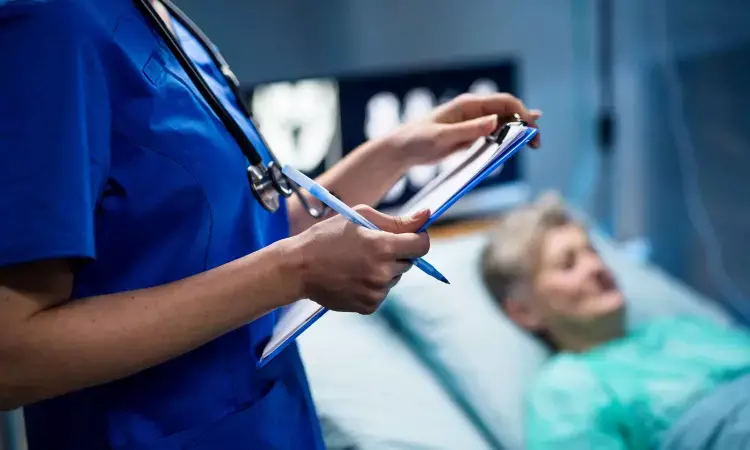- Home
- Medical news & Guidelines
- Anesthesiology
- Cardiology and CTVS
- Critical Care
- Dentistry
- Dermatology
- Diabetes and Endocrinology
- ENT
- Gastroenterology
- Medicine
- Nephrology
- Neurology
- Obstretics-Gynaecology
- Oncology
- Ophthalmology
- Orthopaedics
- Pediatrics-Neonatology
- Psychiatry
- Pulmonology
- Radiology
- Surgery
- Urology
- Laboratory Medicine
- Diet
- Nursing
- Paramedical
- Physiotherapy
- Health news
- Fact Check
- Bone Health Fact Check
- Brain Health Fact Check
- Cancer Related Fact Check
- Child Care Fact Check
- Dental and oral health fact check
- Diabetes and metabolic health fact check
- Diet and Nutrition Fact Check
- Eye and ENT Care Fact Check
- Fitness fact check
- Gut health fact check
- Heart health fact check
- Kidney health fact check
- Medical education fact check
- Men's health fact check
- Respiratory fact check
- Skin and hair care fact check
- Vaccine and Immunization fact check
- Women's health fact check
- AYUSH
- State News
- Andaman and Nicobar Islands
- Andhra Pradesh
- Arunachal Pradesh
- Assam
- Bihar
- Chandigarh
- Chattisgarh
- Dadra and Nagar Haveli
- Daman and Diu
- Delhi
- Goa
- Gujarat
- Haryana
- Himachal Pradesh
- Jammu & Kashmir
- Jharkhand
- Karnataka
- Kerala
- Ladakh
- Lakshadweep
- Madhya Pradesh
- Maharashtra
- Manipur
- Meghalaya
- Mizoram
- Nagaland
- Odisha
- Puducherry
- Punjab
- Rajasthan
- Sikkim
- Tamil Nadu
- Telangana
- Tripura
- Uttar Pradesh
- Uttrakhand
- West Bengal
- Medical Education
- Industry
Increased time from COVID-19 to surgery lowers postoperative CV morbidity: JAMA

USA: A recent study in JAMA Network Open has suggested that increased time from diagnosis of COVID-19 to surgery was linked with decreased odds of significant postoperative problems; this trend of decreasing risk persists longer than previously known, for as long as 13 months after surgery.
Researchers at Vanderbilt University Medical Center reported that when patients undergo any type of surgery after having had COVID, their odds of major postoperative cardiovascular morbidity diminish with elapsed time from COVID diagnosis.
This information should be used to better inform risk-benefit discussions regarding optimal surgical timing and perioperative outcomes for patients with a history of COVID-19 infection.
The researchers used electronic health record data from 3,997 adult surgical patients with a history of SARS-CoV-2 infection who underwent surgery at VUMC from March 2020 to December 2021. The time from COVID diagnosis to surgery was a median of 98 days.
The team analyzed composite odds of various cardiovascular problems within 30 days following surgery: deep venous thrombosis, pulmonary embolism, cerebrovascular accident, myocardial injury, acute kidney injury, and death.
The incidence of this 30-day composite outcome dropped steeply at first, from approximately 18% to 10% over the first 100 days after COVID diagnosis. It then dwindled steadily for the next 10 months, reaching approximately 8% after 400 days from COVID diagnosis. The rate of decreasing risk was unaffected by patients' COVID-19 vaccination status.
"Compared to previous population studies of this issue, ours is distinguished for tracking surgical outcomes more broadly and using a longer time horizon from COVID diagnosis," said Robert Freundlich, MD, MSCI, associate professor of Anesthesiology and Biomedical Informatics, who led the study with critical care medicine fellow John Bryant, MD.
"As we were midway in our study, based on postoperative pulmonary outcomes, one medical society issued a recommendation to delay surgery after COVID-19 by up to 12 weeks in more severe cases of COVID," Freundlich said. "Meanwhile, concerning this range of cardiovascular problems, in our data we were surprised to find a trend of subsiding risk still discernable more than a year after COVID diagnosis.
"In a given patient's case, many considerations can influence when surgery should best occur, and our results further indicate that doctors and patients would do well to include proximity to COVID in their thinking."
Reference:
John M. Bryant, Christina S. Boncyk, Kimberly F. Rengel, Connor Snarskis, Matthew D. McEvoy, Karen Y. McCarthy, Gen Li, Warren S. Sandberg, Robert E. Freundlich, JAMA Netw Open. 2022;5(12):e2246922. doi:10.1001/jamanetworkopen.2022.46922
Dr Kamal Kant Kohli-MBBS, DTCD- a chest specialist with more than 30 years of practice and a flair for writing clinical articles, Dr Kamal Kant Kohli joined Medical Dialogues as a Chief Editor of Medical News. Besides writing articles, as an editor, he proofreads and verifies all the medical content published on Medical Dialogues including those coming from journals, studies,medical conferences,guidelines etc. Email: drkohli@medicaldialogues.in. Contact no. 011-43720751


